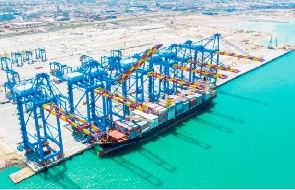Major trade associations in the country have expressed confidence that the newly passed Ghana Shippers’ Authority (GSA) law will address the recurrent challenges of unfair and excessive charges that have burdened traders using Ghana’s sea and airports for years.
The GSA has been granted enhanced oversight powers to ensure fair and reasonable agreements between shippers and service providers under major legislative amendments.
The new amendments to the existing law mandate that the Authority must now negotiate and approve all charges in the commercial shipping sector.
GITC
According to the Deputy Chairman of the Ghana International Trade Commission and technical advisor at the Ministry of Trade and Industry, Prof. Paul Kuruk, this measure will protect smaller freight forwarders from being overpowered by larger shipping lines, ensuring equitable conditions across the industry.
Speaking after a meeting held with the trade associations at the Ghana Shipper’s House in Accra, including the Association of Ghana Industries (AGI), the Ghana Union of Traders’ Association (GUTA), and the Ghana National Chamber of Commerce, Prof. Kuruk explained: “Under the old law, the Authority had no say in the agreements reached between shippers and service providers. Now, the Ghana Shippers’ Authority must approve these engagements to prevent excessive or unreasonable terms.”
GUTA
Speaking to the media on the sidelines of the meeting, the President of the Ghana Union of Traders Association (GUTA), Dr. Joseph Obeng, was optimistic that the new legislation would empower the GSA to regulate charges, thus providing significant relief to the business community.
“We have always said that the Ghana Shippers’ Authority does not have teeth to bite and we have been propagating the need to have our laws revised given the many challenges we face at the port, especially from the shipping lines that we deal with, particularly in terms of charges and fees.
“The cost of doing business in this country is just too high, and so if this Act seeks to empower the Ghana Shippers’ Authority to make sure that some controls are brought in so that they can approve some of these charges or disapprove of them so that we can have the respite to do our business and also grow, then that’s a welcome development and that makes the Act very important for us, and we support it,” Dr. Obeng said.
AGI
The President of the Association of Ghana Industries (AGI), Dr. Humphrey Ayim Darke, said the law will promote equitable business costs, especially those related to port activities. “The Association of Ghana Industries welcomes this Act fully as it seeks to strengthen the business community in two ways.
First, for the GSA, it gives them the capacity to engage with our agents in a very equitable manner. The role of the Ghana Shippers’ Authority is well defined in the Act and they become more like a referee to aid us in creating the equity that is needed.
“Second, with regards to the cost of doing business, especially from the point of entry, where the various costs that fit into our production are raised by virtue of the agents’ role. So, as I said earlier, we welcome the Act, and going forward, as explained by the Deputy Trade Minister and the CEO of the GSA, an L.I. will be developed to deepen the mechanisms of implementation of the Act so that where there are grey areas, we will be able to use the L.I. to perfect it,” he remarked.
MOTI
Deputy Minister for Trade and Industry (MOTI) and a member of the Road and Transport Committee of Parliament, Kofi Ahenkorah Marfo, who also addressed journalists after the meeting, said the passing of the Ghana Shippers’ Authority Bill 2024 would introduce transparency in the determination of port fees and charges, ensuring accountability in the legal movement of international trade cargo across all borders of Ghana.
He added that it would further make Ghana a preferred transit trade channel for landlocked neighbours Burkina Faso, Mali, and Niger, and overall, enhance the sector’s revenue contribution to the national purse.
“It is important for us to refresh the law. As we speak, we have engaged with stakeholders in the shipping industry. We hope to continue this engagement to ensure continuous collaboration. This will help address any challenges in the Act and move forward with a unified and cohesive shipping industry,” he stated.
This move is expected to foster increased participation of local firms in providing services within the sector, Mr. Marfo added.
GSA CEO
In an earlier comment when the Bill was passed on Monday, 29th July 2024, the Chief Executive Officer of the Ghana Shippers Authority, Kwesi Baffour Sarpong, said that while the amended law is a significant step in the right direction, it is not a magic silver bullet.
The GSA is prepared for a collaborative approach to addressing any issues that may arise, given their longstanding cordial relationships with all stakeholders.
He assured stakeholders that the enforcement of the law will be fair and representative of the interests of the shipping industry, marking a major win for Ghana in its quest to become the preferred trade hub in the region.
Background
Parliament passed the Ghana Shippers’ Authority Bill 2024 on Monday, 29th July 2024. The new law, which amends the 50-year-old NRCD 254 (1974) establishment Act, will regulate the commercial activities of shippers.
It is designed to address unfair and excessive charges that burden traders using Ghana’s sea and airports, as well as land borders for international trade.
Parliament’s Committee on Roads and Transportation noted in its report that exorbitant charges imposed by some service providers, especially at sea and airports, hinder business growth and contribute to a needless rise in the prices of goods and services.
The new law is expected to enhance transparency and accountability and drive improved revenue generation and collection for national socio-economic growth.
Business News of Tuesday, 6 August 2024
Source: thebftonline.com
Shippers' Authority gains new powers to regulate commercial shipping sector
Entertainment
















